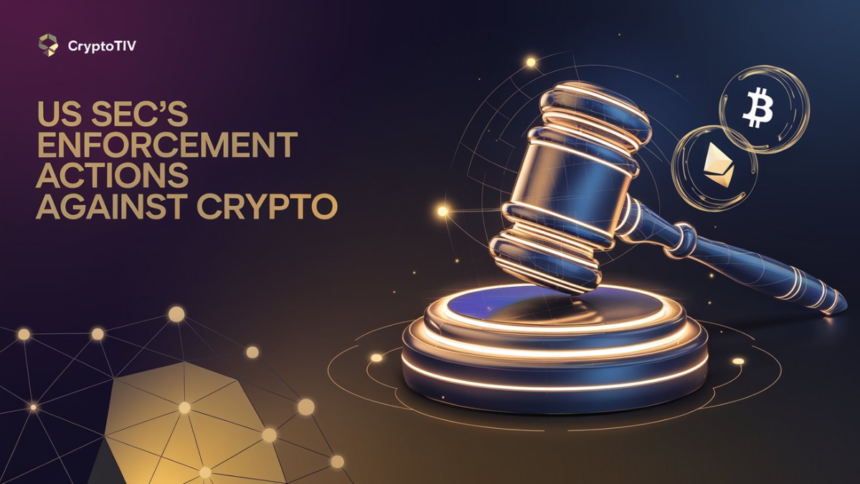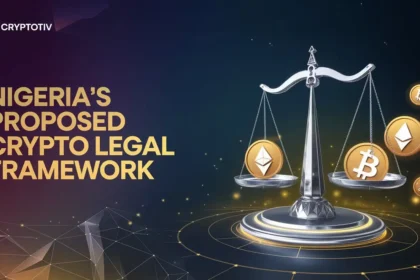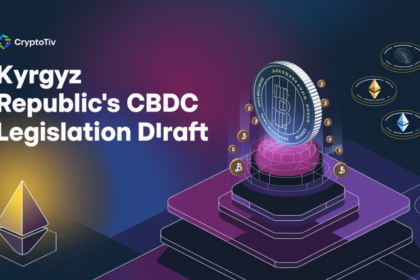The US SEC’s crypto enforcement actions intensified. Fines exceeded $4.7 billion, mostly from high-profile cases like Terraform Labs. These actions are reshaping market compliance and investor protection and creating a stricter regulatory environment for cryptocurrency businesses. Long-term market effects are unfolding swiftly.
Overview of SEC’s Crypto Enforcement Strategy in 2024
The U.S. SEC it changed its enforcement strategy, especially in crypto. Unlike previous years, the SEC has now adopted a more focused approach. It cast a wide net over many more minor cases in the past. This year, it concentrated on fewer cases but with higher financial penalties. This strategy was shown by the $4.47 billion settlement with Terraform Labs. It was a record amount and made up most of the 2024 total fines of $4.7 billion. This case reshaped cryptocurrency regulation. It warned of the risks of non-compliance.
Major Cases Leading the SEC’s Enforcement Surge
Several high-profile cases drove the SEC’s enforcement actions in 2024. The most notable was the Terraform Labs settlement. The company and its founder, Do Kwon, were fined $4.47 billion. They misled investors and offered unregistered securities. This case set a new precedent in crypto regulation. It is especially relevant to algorithmic stablecoins like TerraUSD (UST). Other significant actions included penalties against Ripple Labs and GTV Media Group. Ripple Labs was fighting the SEC over selling XRP as an unregistered security. GTV Media Group faced $539 million in fines for an unregistered securities offering.
Shift Toward Larger Penalties
The SEC’s shift to fewer, more significant enforcement actions is clear. Fines have soared. Though cases fell from previous years, total penalties soared by over 3,000%. This was mainly due to landmark cases like Terraform Labs. The average fine in 2024 surged to over $420 million, compared to much smaller fines in earlier years. This approach aims to set industry precedents and punish non-compliance with severe financial penalties.
| Date | Company | Amount of Penalty | Reason for Enforcement |
|---|---|---|---|
| June 2024 | Terraform Labs | $4.47 billion | Unregistered securities and misleading investors |
| 2021 | Ripple Labs | $125 million | Sale of unregistered securities (XRP) |
| 2021 | GTV Media Group | $539 million | Illegal unregistered offering of digital assets |
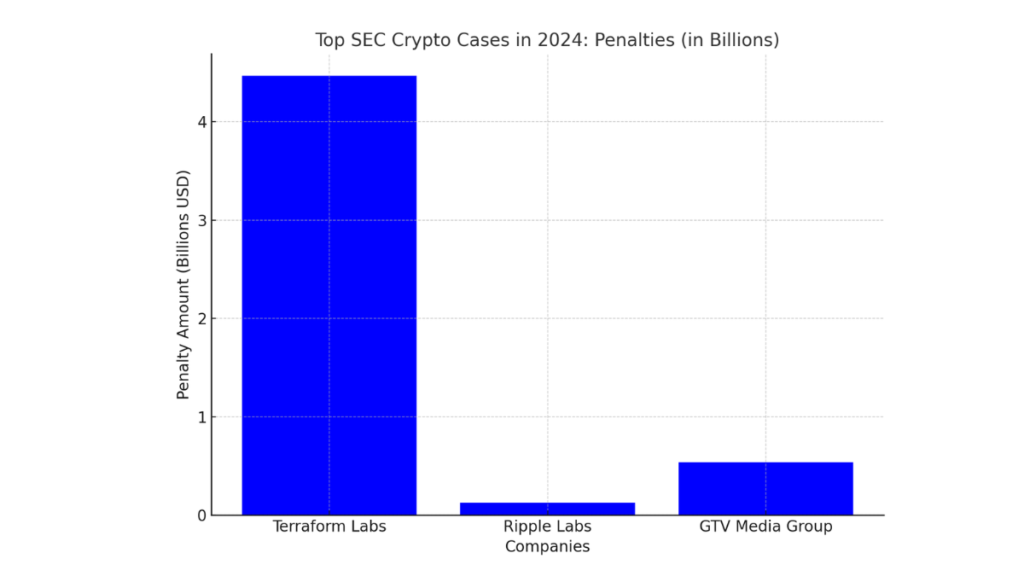
The bar chart shows the SEC’s penalties on major crypto firms in 2024. It shows the penalties in billions of dollars for Terraform Labs, Ripple Labs, and GTV Media Group.
Impact of SEC Enforcement on Crypto Market Compliance
The SEC’s stricter enforcement has forced crypto firms to rethink compliance. The SEC has made it clear: non-compliance will not be tolerated. The regulatory landscape has become more stringent. Crypto exchanges, platforms, and DeFi users now prioritize regulations. This is in response to high-profile cases like Terraform Labs and Ripple. These actions are reshaping the industry. They urge businesses to build robust compliance frameworks. This is to avoid heavy penalties and disruptions.
Compliance Challenges for Crypto Firms
Crypto firms must align with SEC rules, especially on registration and disclosure. It’s a big challenge. Many companies that offer staking-as-a-service or token sales have struggled to follow complex rules. The SEC is now scrutinizing unregistered securities offerings more and penalizing firms operating without the right licenses. Crypto firms must now meet strict new regulations and avoid enforcement actions. So, they have invested heavily in legal and compliance departments.
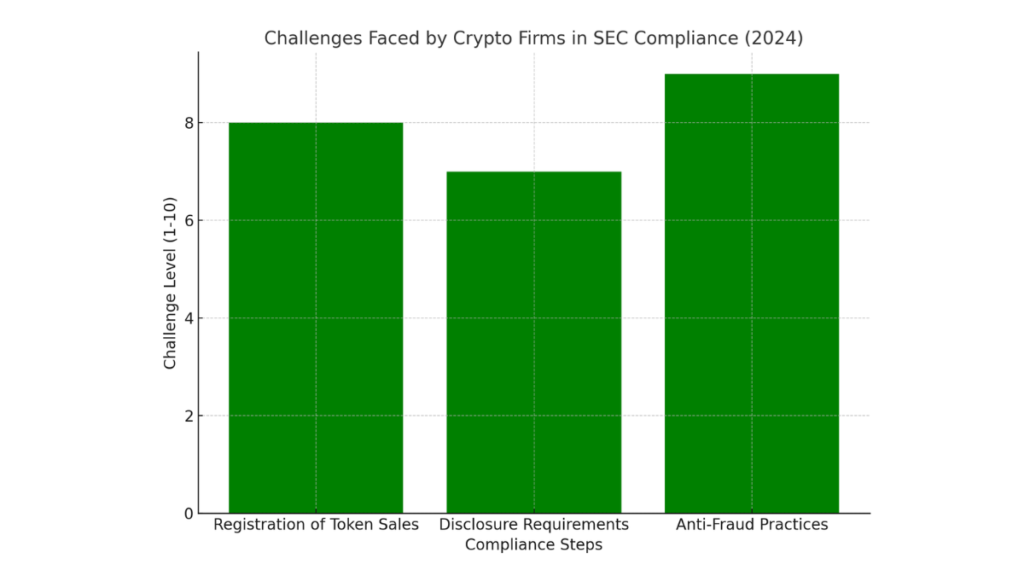
The bar chart above illustrates crypto firms’ challenges in complying with SEC regulations in 2024. It highlights three key compliance areas: 1. Registration of Token Sales, 2. Disclosure Requirements, and 3. Anti-Fraud Practices. Each was scored on a 1 to 10 scale. The score reflects the difficulty or commonality of challenges faced by firms.
SEC’s Focus on Investor Protection
The SEC’s enforcement actions are heavily centered on protecting retail investors. The commission aims to protect inexperienced, vulnerable investors from high-return scams. Many of its cases involve fraudulent investment schemes and unregistered securities. They often target minority and less-experienced investors in crypto. The SEC aims to boost trust by tackling scams and unregistered offerings.
Compliance Checklist for Crypto Firms Post-2024 SEC Actions:
- Register Token Sales: All public tokens must be SEC-registered. This avoids them being unregistered securities.
- Disclosure Requirements: Fully disclose and explain the risks of any crypto offerings or platforms.
- Anti-Fraud Practices: Use strong anti-fraud measures, such as transparent business practices and regular audits, to ensure compliance with SEC rules.
Legal Ramifications for Crypto Businesses
The SEC’s aggressive 2024 enforcement actions set precedents. They have significant effects on crypto firms. High-profile cases against Terraform Labs and Ripple show a risk. Firms can face severe penalties for violating securities laws. These actions are changing the law. They are reclassifying and regulating cryptocurrencies as securities. The SEC is holding firms accountable for unregistered offerings and fraud. As a result, crypto businesses are in a strict legal spot.
Legal Precedents Set by SEC Enforcement
Landmark cases like Terraform Labs and Ripple set vital legal precedents. They will influence future cryptocurrency regulation. The SEC’s $4.5 billion fine against Terraform Labs for fraud set a new high for enforcement penalties. It also reinforced that stablecoins, like TerraUSD, can be treated as securities undU.S..S. law. This case and Ripple’s fight with the SEC hinge on the Howey Test. It determines if an asset is a security. Conflicting rulings in these cases show how complex it is to regulate digital assets. Future legal decisions could further refine what a security is in the crypto space.
Note
The Ripple case is essential. It challenges the idea that cryptocurrencies sold on secondary markets are securities. The cases’ legal outcomes will likely affect other crypto firms and shape what offerings these firms can legally make. This uncertainty makes it vital for crypto firms to check their legal compliance.
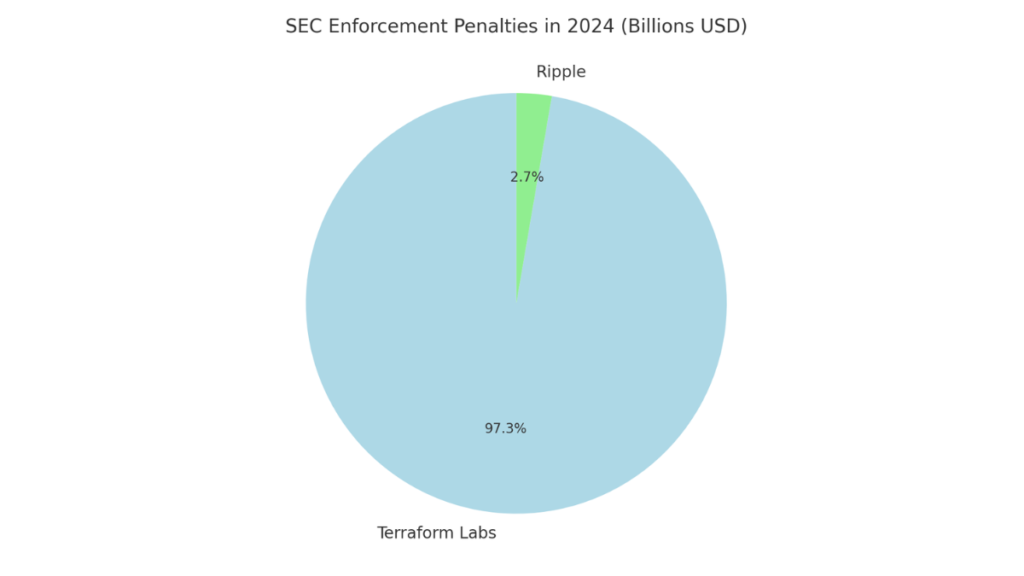
The pie chart shows the 2024 SEC enforcement penalties. It compares fines on Terraform Labs ($4.5 billion) and Ripple ($125 million). This visual representation highlights the significant disparity in penalties between the two cases.
Impact on Cross-Border Crypto Transactions
The SEC’s expanded scrutiny also has implications for cross-border crypto transactions. Many crypto platforms operate globally. This raises questions about how U.S. rules, like the SEC’s, affect their global operations. The SEC’s actions stress the need to enforce U.S. laws on crypto firms targeting U.S. investors or operating in tU.SU.S. The legal issues grow as DeFi protocols and global exchanges navigate a patchwork of international rules. They must also comply with U.S. laws. This focus could force global platforms to change their business models. They’d need to avoid SEC enforcement. This would complicate the already challenging regulatory environment for crypto firms.
Future of Crypto Regulation in Light of SEC Actions
The SEC’s 2024 enforcement strategy is shaping crypto regulation, and there is debate about its long-term effects. The SEC imposes stricter controls on decentralized finance (DeFi) and token sales. The legal landscape for crypto firms is changing at a rapid pace. Many experts predict that this year’s enforcement actions will shape future crypto laws. So, the need for more explicit regulations is urgent. The SEC’s actions are not about enforcement. They signal a push to align crypto markets with traditional securities frameworks.
Legislative Responses to SEC Enforcement
The SEC’s aggressive actions have not gone unnoticed. Legislators at both state and international levels are responding. They are scrutinizing and proposing more explicit regulations. In U.S., the FIT 21 bill is a key proposal. It seeks to clarify the roles of various regulators, including the SEC and the CFTC. This bill aims to create a stricter regulatory environment. It will categorize digital assets as either commodities or securities. The SEC and CFTC have shared authority. This may complicate things, especially when defining where staking programs fit in. These challenges and criticism from the crypto community suggest that laws will be vital in shaping crypto firms’ compliance.
How Crypto Firms Are Adapting to New Regulatory Pressures
Amid this changing regulatory landscape, crypto firms are finding ways to adapt. Many exchanges and DeFi protocols are evolving to meet new SEC rules on registration and compliance. Staking-as-a-service providers are now reevaluating their services. They want to avoid being classified as unregistered securities under SEC scrutiny. DeFi platforms are shifting, too. They’re focusing on compliance with U.S. and global regulations. Some in the industry resist, but this trend suggests that crypto firms will prioritize compliance.
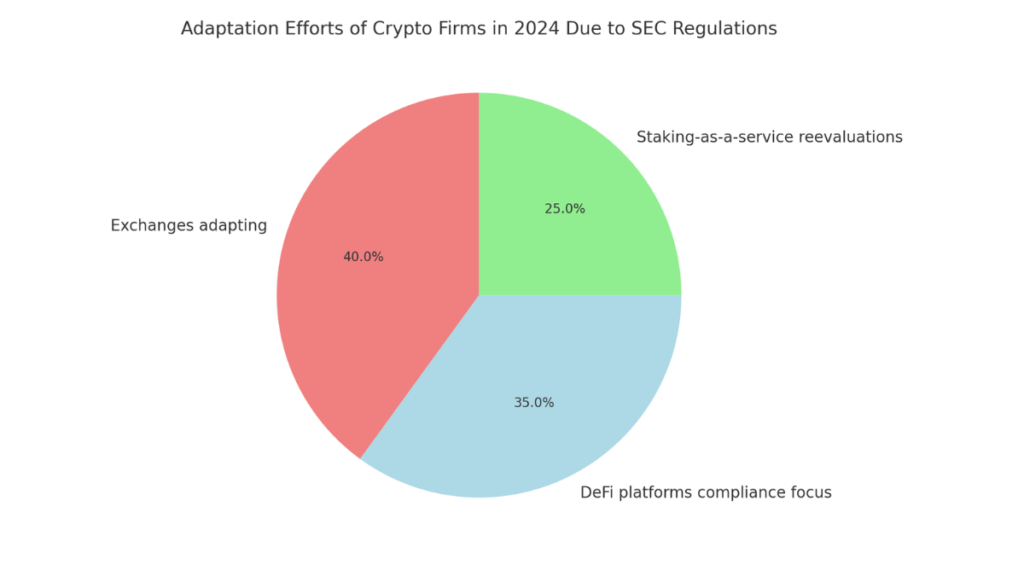
The pie chart above illustrates crypto firms’ adaptation efforts in 2024 in response to SEC regulations. It shows how exchanges, DeFi platforms, and staking-as-a-service providers now focus on compliance. This graphic shows that exchanges are leading in compliance, followed by DeFi platforms and staking services.
SEC’s Enforcement Strategy and Market Reactions
The SEC’s strict enforcement has caused significant volatility in crypto markets. Many traders and investors blame the SEC for the market’s unpredictability, pointing to high-profile cases and heavy penalties. The SEC’s focus on bigger fines and fewer cases has changed the rules, and crypto firms are now scrambling to adapt. As a result, market liquidity has been affected. Trading volumes fell, and both investors and exchanges are now more cautious.
Short-Term Market Volatility Following Major SEC Cases
The SEC’s enforcement actions have directly contributed to short-term market volatility. In particular, the cases involving Terraform Labs and Ripple saw immediate market reactions. A $4.47 billion fine on Terraform Labs spooked the market, causing sharp drops in some asset prices and reduced liquidity on several exchanges. Similarly, Ripple’s legal battle caused a stir in the XRP markets, with the price of XRP fluctuating as the case progressed. These high-profile actions caused uncertainty in the market and hurt investor confidence and trading volumes.
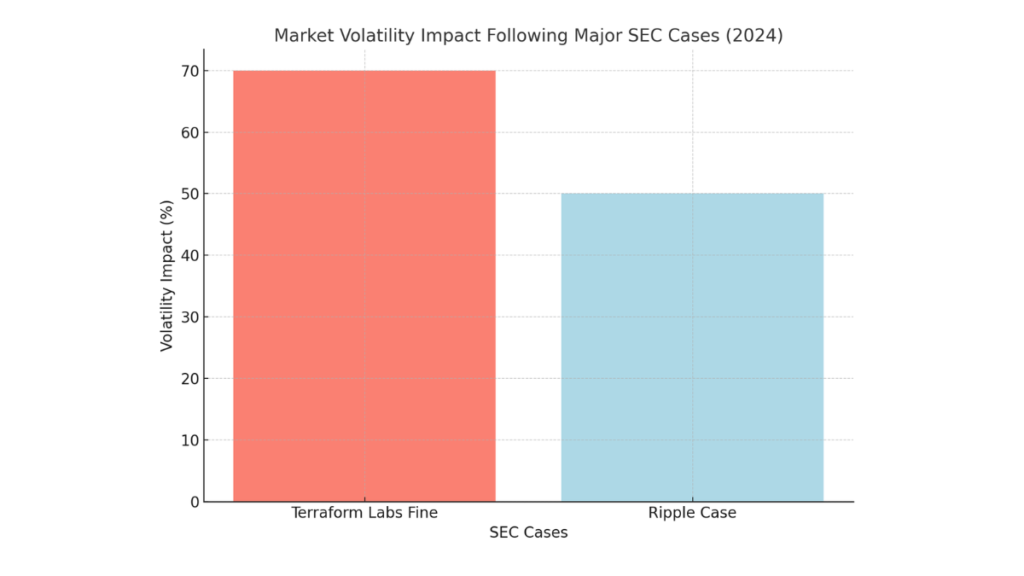
The bar chart above shows the effect of major SEC cases on market volatility in 2024. It shows the sharp rise in volatility after the Terraform Labs delicate and the Ripple case. The chart shows hypothetical market volatility impacts. Terraform Labs caused a more significant spike than Ripple.
Long-Term Effects on Crypto Market Structure
The SEC’s actions will likely result in a more compliance-focused market structure in the long term. Exchanges and platforms must follow strict rules to avoid penalties. Compliant exchanges are gaining credibility and market share, while non-compliant firms are facing heavy fines or shutdowns. The SEC’s focus on transparency will likely reshape crypto exchanges. To succeed, they must follow new regulations for investor protection.
Links Suggestions
- “Crypto Market Reactions to Interest Rate Changes“
- “Impact oU.S.US Inflation Data on Crypto“
- “Role of Crypto in High Inflation Economies“
- “Taiwan’s Digital Asset Regulations Update“
- “MiCA’s Impact on Self-Hosted Wallets”
The SEC’s 2024 enforcement actions mark a shift in crypto market regulation. The SEC is reshaping markets, targeting high-profile cases, and imposing record fines to boost compliance. The long-term impact will likely be a more transparent, accountable crypto ecosystem. However, short-term volatility and uncertainty are still challenges. As regulations change, crypto businesses must adapt to survive.



